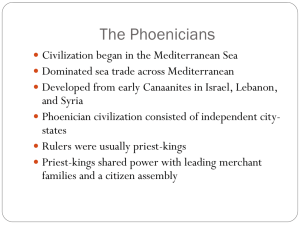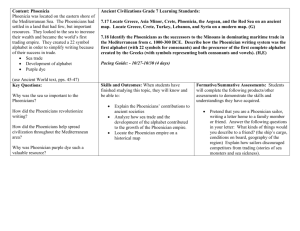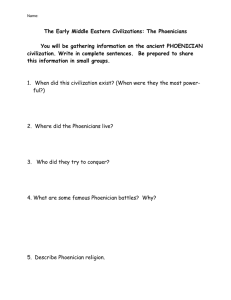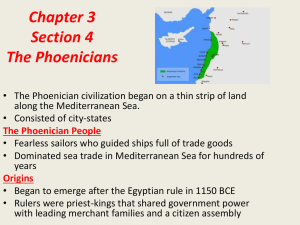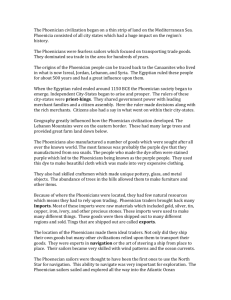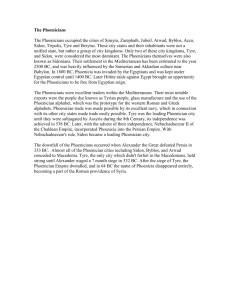The Phoenicians - Norwell Public Schools
advertisement
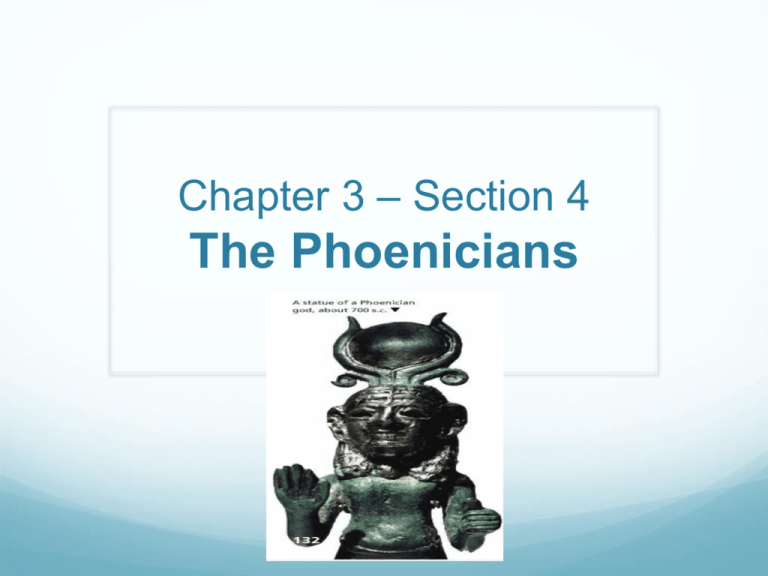
Chapter 3 – Section 4 The Phoenicians The Phoenician People Phoenician civilization began along a thin strip of land along the Mediterranean coast. Fearless sailors who for hundreds of years dominated sea trade Phoenicians society was developed by the earlier Canaanites – lived in now Israel, Jordan, Lebanon, and Syria Egypt had a strong influence on Canaan and even ruled them in 1500 B.C. In 1150 B.C., Phoenician society emerged after Egyptian rule Phoenicians city-states were ruled by priest-king. They shared power with leading merchant families and a citizen assembly. Farming and Manufacturing There was very little flat land to farm They manufactured cloth with a rare purple dye from tiny sea snails, made pottery and glass and metal objects Used trees to make wood furniture and other items Phoenicians Traders They had very few natural resources They imported mostly raw materials from other cultures Raw materials were gold, silver, tin, copper, iron, ivory, and precious stones Crafterworkers used the raw materials to make bronze and silver bowls, iron tools and weapons, and gold jewelry They exported these items as well as pine, cedar logs, wine, olive, oil, salt, fish and other goods Phoenician Trade Routes Phoenicians and the Sea Many people depended on the Phoenicians for their trade Phoenicians sailed their ships by a sail or by rowers using oars They were experts at navigation, the art of steering a ship from place to place First to use the North Star to help calculate location Exploring Unknown Waters Phoenicians traveled many routes South and west pasted Egypt North and west past the Balkan and Italian peninsula Islands of Sardinia and Sicily End of the Mediterranean Iberia (today Spain and Portugal Went north in the Atlantic Ocean to Britain Historians believe that Phoenicians were driven to explore in order to find silver and gold for greater wealth Colonies and City-States As Phoenicians traveled they found shelter at many ports, which served as trading stations Later, areas with fertile land or other resources, Phoenician settlers began to live there. These areas grew into colonies, an area ruled by a distant country When Phoenicia came under attack in 800 B.C., by Assyrians, many Phoenicians went to these colonies A few Phoenician colonies developed into wealthy city states. One was Carthage on North African coast. Legacy of the Phoenicians As Phoenicia did not survive, Greece and Rome absorb key elements of their culture. This process is known as cultural diffusion Their legacy was the spread of their culture and a new way of writing Phoenician standard for weight and measures was passed to the Greeks The Greeks also adopted their alphabet, a small set of letters or symbols, each of which stands for a single sound The Phoenician alphabet contained 22 symbols representing a consonant sound. Made writing easier The Alphabet 750 B.C., the Greeks were using it 500 B.C., the Greeks added letter to represent vowels Gave letters names Alphabet comes from first 2 letters in the Greek alphabet – alpha and beta 100 B.C. Romans adopted it – Change some, but looks like todays alphabet
